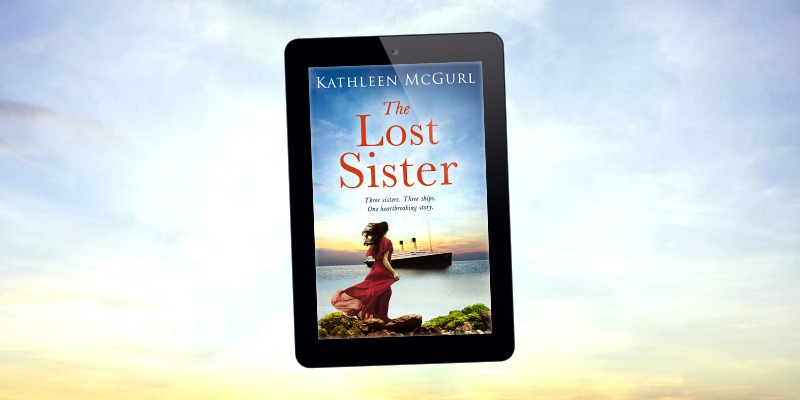The Lost Sister is Kathleen McGurls latest unforgettable timeslip novel. To celebrate it’s upcoming release, we asked the author where she finds her inspiration. Read on to find out some fascinating places Kathleen McGurl found her stories.
On Inspiration by Kathleen McGurl
‘Where do you get your ideas from?’ is probably the most common question a novelist gets asked. A flippant answer that I have been known to give on occasion, is that I buy them from the Ideas Shop on the corner, where they sell for ten a penny.
The truth is more convoluted, of course. For some novels I can’t always give a quick answer. Inspiration has come from all over the place and lots of smaller ideas have merged into one in my head. This was the case with my last book The Forgotten Gift. Sometimes I’ve decided I want to write about a particular place or time period, and have had to brainstorm to find a plot to fit.
I write dual timeline books, in which a historical mystery is uncovered and resolved in the present day. So I need to come up with two storylines. One historical and one contemporary – and they must dovetail together by the end of the book.
Often a setting provides the link between the two strands – as with my book The Drowned Village. This is set in a fictionalised version of Mardale, in the Lake District. I remember standing with a friend reading an information board in the car park there, about how the village of Mardale Green had been evacuated and demolished to make way for the Haweswater Reservoir in the 1930s, and how occasionally the reservoir dries out, exposing the remains of the village. ‘Here, Kath,’ said my friend, ‘you could write a novel about this.’ A lightbulb pinged on in my head and I instantly knew that yes, indeed I could. By the end of that day I’d more or less worked out the plot.
For The Secret of the Château, I knew I wanted to write a book set in France, as I’d had the idea of a group of newly retired people buying a château together to live communally. This was a rare occasion when the contemporary story idea came to me first, inspired by a real-life slightly drunken evening with a group of friends. But what to use for the historical story? I quickly decided it’d have to be the French Revolution. An obvious context but one that worked very well for the story.
Another occasion where an idea for a novel appeared very quickly in my head was my new book that’s being published May 2021, The Lost Sister. As for The Drowned Village I can remember exactly where I was when the idea arrived.
I was sitting with my brother in a local pub – he’d come to stay for a few days, pre-Covid. He was telling me about a new book he’d bought that he was about to start reading. ‘It’s about the Olympic,’ he said. ‘Titanic’s sister ship. Actually, there were three sisters…’
I think I switched off from listening to him at that point. Those words ‘three sisters’ had snagged on something in my mind. Three sisters, three ships, one mystery…
I interrupted him. ‘There’s a novel in that – three sister ships, three girls working on them. Tell me more about Olympic and the third ship.’ He was more than happy to chat away about what he knew of them, and I scribbled a few notes in a notebook I always carry in my handbag.
By the time we left the pub that night, I had the beginnings of the novel clear in my mind, and I knew it would work. My brother helped further. He lent me that book on the Olympic as well as many other books he owned about Titanic. I never knew he had such an interest in these old ships! Of course I re-watched the film Titanic too, as background research. I loved doing the research for this novel. Although, of course it was heart-breaking knowing how many people died when Titanic went down.
Early on when researching this novel I came across the story of Violet Jessop, who worked on all three of those sister ships. Her memoirs were posthumously published as Titanic Survivor, and I managed to buy a second hand copy of the book. This was so useful. Reading a first hand account of what it was like working as a stewardess on board the great liners. And of course, reading Violet’s own account of Titanic’s sinking. I got so much from her book I decided to include her as a minor character in my own novel. Well, my character needed a friend on board ship, and who better than another stewardess?
I think most novelists would agree with me that ideas are not the difficult part of writing. It’s actually getting enough words down on paper in approximately the right order to do justice to the idea that’s hard! I keep a spreadsheet of potential future novel ideas. This could be anything from ‘write something about suffragettes’ to ‘graves of sailors from Battle of Trafalgar are in a cemetery in Gibraltar…’ Anything that’s occurred to me on my travels or from my reading, that I think I’d enjoy researching and would like to write a novel about. You have to live with an idea for a long time while writing it and then editing it, so you really do need to be happy with it and excited about it!
The Lost Sister, the unforgettable and heartbreaking historical timeslip novel, is out 12th May. You can pre-order it here.



